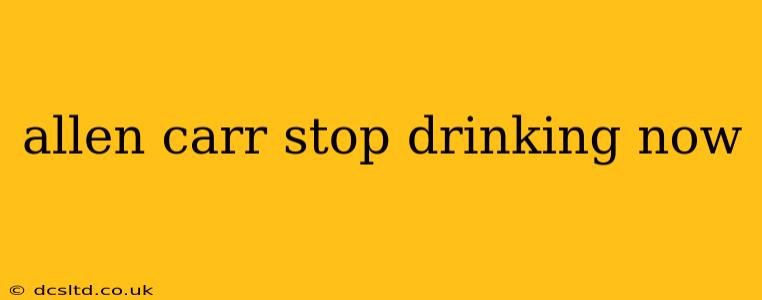Allen Carr's "Easyway to Stop Drinking" has become a globally recognized method for overcoming alcohol addiction. Unlike traditional methods that rely on willpower and struggle, Carr's approach focuses on re-educating the mind, helping individuals understand and ultimately overcome their cravings. This detailed analysis will explore the core principles of the method, address common questions, and examine its effectiveness.
What is Allen Carr's Easyway?
Allen Carr's Easyway is a self-help program designed to help people quit drinking alcohol without relying on willpower, medication, or support groups. The core principle rests on the idea that the desire to drink isn't a physical addiction but rather a deeply ingrained mental belief system. The program aims to dismantle these beliefs, revealing the flawed logic behind the desire to drink and ultimately removing the craving. This is achieved through a process of re-education, where participants gain a new understanding of their relationship with alcohol. The method uses a series of carefully structured sessions, presented in the book and sometimes through workshops, to achieve this cognitive shift.
How Does the Easyway Method Work?
The Easyway method doesn't involve gradual reduction or substitution. Instead, it encourages readers to understand the irrational nature of their desire to drink. It challenges the common misconceptions surrounding alcohol addiction, such as the belief that quitting will be difficult, painful, or require immense willpower. The program focuses on identifying and challenging these beliefs, replacing them with a rational understanding of the reality of alcohol consumption. The process involves:
- Understanding the fallacy of addiction: The program argues that the craving for alcohol is not a physical dependency, but a psychological one, rooted in flawed thinking patterns.
- Challenging beliefs: Participants are guided to question their beliefs about alcohol, such as its ability to alleviate stress or enhance social situations.
- Reframing the perception of alcohol: The program helps individuals see alcohol for what it is – a substance that ultimately limits their freedom and happiness.
- Acceptance and freedom: By understanding the irrationality of their craving, participants are freed from the mental shackles of addiction, allowing them to quit without suffering withdrawal symptoms or intense cravings.
Does Allen Carr's Easyway Really Work?
The effectiveness of the Easyway method is a subject of ongoing debate. While many people have reported significant success using the method, there's limited rigorous scientific research to support its claims. Anecdotal evidence suggests a high success rate, however, this lacks the control and objectivity of clinical trials. The success of the method likely depends on individual factors, including the severity of the addiction and the individual's openness to the method's principles.
Is Allen Carr's Easyway Right for Everyone?
The Easyway method may not be suitable for everyone. Individuals with severe alcohol dependence, those with co-occurring mental health conditions, or those requiring medical intervention may benefit from other approaches such as medically supervised detoxification or therapy. The Easyway method is best suited for individuals who are motivated to quit and are open to a cognitive-behavioral approach.
What are the Benefits of Allen Carr's Easyway?
One of the primary benefits is its focus on mental freedom rather than brute force willpower. It removes the stigma and struggle often associated with quitting, offering a more positive and empowering approach. The method is also self-directed, removing the need for expensive therapies or support groups, making it accessible to a wider range of people.
What are the Drawbacks of Allen Carr's Easyway?
The lack of rigorous scientific evidence supporting its effectiveness is a significant drawback. Its reliance on cognitive re-framing may not be effective for individuals with severe alcohol dependence or underlying mental health issues. Finally, the method's success heavily relies on the individual's ability to embrace and understand the underlying principles.
This exploration of Allen Carr's Easyway provides a comprehensive understanding of the method's core principles, benefits, limitations, and effectiveness. Individuals considering this approach should carefully weigh the pros and cons and consider their individual circumstances before proceeding. It is always advisable to consult with a healthcare professional or addiction specialist to determine the best course of action for your specific situation.
